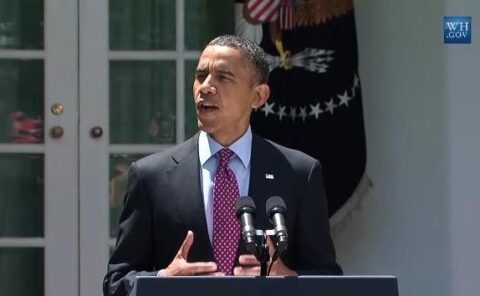Immigration at the Border

Does the Supreme Court Think Most Immigrants are Criminals?
Even as the Supreme Court struck down three provisions of Arizona’s anti-immigrant law (SB 1070), the Justices appeared to embrace a major falsehood of nativist ideology: that immigrants are more likely to be criminals than the native-born. On page six of the majority opinion, the Court maintains that unauthorized immigrants are “reported to be responsible for a disproportionate share of serious crime” in Arizona’s Maricopa County. The source cited for this bold statement is a 2009 report from the Center for Immigration Studies (CIS)—a deeply flawed report which attempts to overturn a century’s worth of research demonstrating that immigrants are less likely than the native-born to commit violent crimes or end up behind bars. Read More

Supreme Court Issues Mixed Decision on Arizona SB 1070
The Supreme Court issued a mixed ruling on Monday in the Obama administration’s challenge to Arizona SB 1070. By a 5-3 margin, the Justices upheld the injunction against provisions of the law that authorize police to arrest immigrants suspected of committing removable offenses (Section 6), and that impose penalties under state law for immigrants who fail to carry “registration” papers (Section 3) or attempt to work without federal authorization (Section 5). Although the Court allowed the implementation of the provision of SB 1070 requiring police to determine the immigration status of people in custody “reasonable suspicion” exists that they are in the country unlawfully (Section 2(B)), it left open the door to future legal challenges. Read More

In Speech, Romney Provides Few Details on Immigration Policy
On Thursday, Mitt Romney gave a much-anticipated speech in which he was expected to address whether—as President—he would reverse the new Obama administration policy toward immigrant youths who would qualify for the DREAM Act. The answer? It’s still unclear. Despite adopting a noticeably softer tone toward undocumented immigrants, Romney again failed to say whether he would overturn the policy and provided few other details as to how he would tackle the most intractable problem of the immigration debate. Read More

DHS Creates Obstacles for Small Businesses Seeking High-Skilled Immigrants
Politicians love small businesses. They also love high-skilled workers. One might assume, then, that entrepreneurs and start-up companies would have a relatively easy time hiring immigrant professionals through the H-1B program. Not so. In fact, a recently released memo confirms that far from receiving preferential treatment, small businesses are singled out for heightened fraud investigations by the Department of Homeland Security (DHS). Read More

President Obama Issued a Directive, Not an “Executive Order” or “New Law”
Immigration hardliners were predictably quick to criticize President Obama’s recent announcement that DHS will use discretion to halt the deportations of eligible immigrant youth. They wasted no time hurling some base-stirring claims—“administrative amnesty,” “end-runs around Congress,” “executive fiat.” However, while folks are free to criticize the President, they should at least strive for accuracy. The President did not create a new law, sign an executive order or grant anyone citizenship or amnesty, he merely directed DHS to exercise discretion to grant deferred action to qualified immigrant youth—an action that is well within his power as President. Read More

A Breakdown of DHS’s Deferred Action for DREAMers
While today’s headlines assess the significance of President Obama’s deferred action announcement on Friday, many are still sorting through the news to get answers to basic questions about who is covered under the new program. Prior to President Obama’s statement that DHS would halt the deportation of immigrant youth who met criteria similar to the DREAM Act, DHS Secretary Janet Napolitano released a memo and a set of questions and answers that outline eligibility and a basic timeline for implementing the new directive . Read More

President Obama to Halt Removal of DREAMers
The Obama administration announced today that it will offer indefinite reprieves from deportation for young immigrants who were brought to the country as minors and meet other specific requirements. The move, hailed by immigration advocates as a bold response to the broken immigration system, temporarily eliminates the possibility of deportation for youths who would qualify for relief under the DREAM Act, giving Congress the space needed to craft a bipartisan solution that gives permanent residence to qualifying young people. In a statement from the White House, President Obama said the policy was “the right thing to do,” calling DREAMers “Americans in their hearts, in their minds, in every single way but one: on paper.” Read More

After 30 Years, Plyler v. Doe Decision Survives but Remains Under Attack
Thirty years ago today, the Supreme Court issued its landmark decision in Plyler v. Doe, holding that states cannot deny a free public education to students for lack of valid immigration status. The decision has since opened the schoolhouse doors to untold numbers of children who might otherwise be deprived of a basic education. Yet today, the decision remains under continued attack from critics who—as part of an ongoing effort to put the issue back before the Justices—appear willing to sacrifice the welfare of U.S. citizens. Read More

After 30 Years, Plyler v. Doe Decision Survives but Remains Under Attack
Thirty years ago today, the Supreme Court issued its landmark decision in Plyler v. Doe, holding that states cannot deny a free public education to students for lack of valid immigration status. The decision has since opened the schoolhouse doors to untold numbers of children who might otherwise be deprived of a basic education. Yet today, the decision remains under continued attack from critics who—as part of an ongoing effort to put the issue back before the Justices—appear willing to sacrifice the welfare of U.S. citizens. Read More

House Votes on Immigration Demonstrate Need for Bolder Executive Action
Last week, the House of Representatives passed an appropriations bill that demonstrates how out of step they are with the public on immigration. House Members passed a series of amendments designed to stop the Obama administration from pursuing humane immigration policies, voting to block funds for any prosecutorial discretion activities, including the new 3 and 10 year bar rule that would allow many applicants to remain in the United States while their applications were being processed. Other amendments would prohibit the administration from cutting 287(g) agreements, funding any alternatives to detention or the ICE Public Advocate’s Office, and even providing translation services for people with limited English proficiency. Read More
Make a contribution
Make a direct impact on the lives of immigrants.
